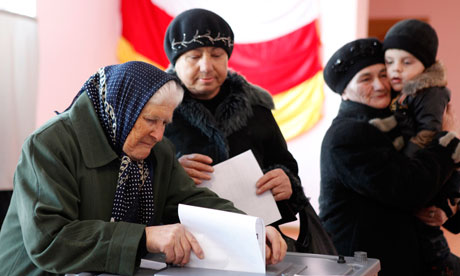The old adage says that dead men tell no tales, however,
thanks to modern science and medicine, corpses now can tell their stories. This
ability is extremely useful as you may imagine, especially if these corpses
happen to be infamous deceased world leaders who suffered, shall we say,
controversial deaths.
Such is the
case with the former leader of the Palestinian Liberation Organization (PLO),
Yasser Arafat.
Before you
start worrying that some terrorist has resurrected Arafat to lead an army to
destroy the world, let me clarify that thankfully that has not happened.
Instead, a joint team of Swede, French, Palestinian, Swiss, and Russian
scientists are excavating Arafat’s tomb in order to exhume his body to
determine whether the former premier was assassinated.
Just a Trace
Last year,
news organization Al-Jazeera published a documentary in which Swiss
experts declared that high levels of the radioactive substance polonium-210 had
been found on Arafat’s clothing and personal belongings in his home. Polonium-210
is not only one of earth’s rarest elements but also one of the most lethal. Ingesting
less than 1 gram (0.04 ounces) of the silver powder can kill a healthy adult in
a matter of a week. Polonium first made headlines in 2006 when it was used
to kill KGB agent-turned-Kremlin critic Alexander
Litvinenko in London. Once again,
the element is suspected as the poison of choice in Arafat’s 2004 death.
CNN
interviewed Francois Bochud, director of
the Institut de Radiophysique in Lausanne, Switzerland. Bochud said his
researchers had tested Arafat's toothbrush, clothing and keffiyeh, the
distinctive black-and-white headscarf he often wore.
A body fluid stain from the
clothing contained 180 megabecquerels per liter of the radioactive isotope,
while a typical sample would contain 5 megabecquerels per liter, Bochud said. (A
becquerel is a unit of measurement of radioactivity for all of you non-geeks
out there.)
Assassination? Maybe.
The close friends and family of Arafat have long
declared that his death was the result of an assassination by the Israeli
secret service. Just prior to his death, Arafat claimed repeatedly that Israeli
special forces were attempting to kill him. Many ignored his claims as the
paranoid accusations of a 75 year-old man against a government that had long
frustrated his hopes of seeing Israel and Palestine united again. However, the
discovery of the presence of polonium-210 has changed the entire situation
surrounding his death, lending credence to the claims of assassination.
One note must be made though—until the full exhumation
and toxicology report is published, no fingers can or should be pointed.
Severe Ramifications
Extreme care must be taken on both sides of the
Israel-Palestine conflict with regards to the results of this exhumation. In
addition to the already tense relations over the incessant rocket attacks from
the Gaza Strip on Israeli urban centers, and the retaliatory airstrikes made by
the Israeli Air Force upon the Hamas/Hezbollah rocketeers, the discovery that
Israel assassinated the Palestinian’s beloved leader could force the area into
a direct and bloody conflict. As scholar
Michael Fisbach notes “To the end of his life, Arafat remained a polarizing
figure. To most Palestinians, he remained the almost mythical symbol of
their drive for independence and dignity, who pulled together a dispersed and
downtrodden people, turned them into a movement, and led them to the doorway of
independence.”
The PLO is seeking to cross that threshold of
independence that Arafat led them to, as evidenced by the recent bid for UN
recognition and membership. The organization is fiercely determined to achieve
acceptance upon the world stage, and to find that Arafat was assassinated would
make the PLO all the more determined to fulfill that dream. Arafat longed to
see a free Palestine and his legacy still lives on. If he was truly a martyr
for the cause, then the cause will be seen as all the more legitimate: a
dangerous place for both Israel and the entire Middle East to be in.
In life, Arafat was, as Fisbach said, a polarizing
figure. He was labeled often as a terrorist, yet was a recipient of the
distinguished Nobel Peace prize for his efforts. In life, he wished to be able to tell the story
of Israeli-Palestinian peace, but now in death his remains may only begin yet
another tale of violence.


